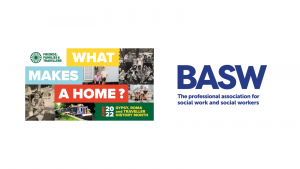BASW blog: Reflections on #WhatMakesAHome

It’s wonderful to be celebrating Gypsy, Roma and Traveller History Month, with the theme of ‘What Makes a Home’.
What makes a home is as diverse as our communities and takes on particular relevance this year, with the enactment of Part 4 of the Police Bill/Act, which we campaigned so vigorously against.
But it's bittersweet to be thinking about what home means when we have a law that can ultimately remove the homes of nomadic Gypsies and Travellers and those who travel for employment, who have no other 'achin tan' or stopping place.
As social workers called in to undertake welfare assessments for families on unauthorised encampments, where the new offence is invoked, we must act in a way which upholds our codes of ethics and absolutely ‘gold-plates’ human rights and equalities legislation - in defiance of what the current statutory draft guidance is telling us.
Respect for human rights and promoting social justice sits at the heart of social work. The Police Act not only cuts right into the heart of Article 8 of the Human Rights Act 1988 - which protects the right to private and family life, including your home - it is also in direct contradiction to our international code of ethics as social workers.
Attempts to invoke the protections of the Human Rights Act are being fundamentally undermined by the UK government, which seeks to dismantle it.
As social workers, we support people to meet their needs and to protect them from harm, in collaboration with family members and others seeking to support them. This has not always been apparent in the way we have approached our support of Gypsy, Traveller, and Roma families - although I’m glad to highlight that this is changing, with evidence of excellent social work practice to be found.
As a profession, we must see this as a pivotal moment and stand in solidarity with Gypsies and Travellers, if we are to uphold the fundamental tenets of our global profession. We know that in England, from the excellent and painstaking research undertaken by Dr Dan Allen and Victoria Hamnett (2022), that Gypsy, Traveller and Roma children are overrepresented in referrals to child welfare services and in being looked after by the state.
There is no reason to suppose that the situation in Wales is any different - especially as we have the highest looked after children rates in the UK. The Gypsy, Roma and Traveller Social Work Association, in our submission to the Independent Review of Children’s Social Care and evidence submitted to the Welsh Government on the impact of the Police Bill on private and family life, have raised our real concerns that more Gypsy, Traveller and Roma children will become involved with child welfare services, and inevitably be removed into state care if their home is taken as a penalty of stopping at an unauthorised encampment.
We know all too well the impact on our families when the state intervenes. We carry the trauma from one generation to the next, and this feeds into some of the worst health (including mental health) inequalities of any community in the UK.
My mother was forcibly removed by the state in the immediate post-war period; she lived for many years in a children’s home where she was denied parental and kinship love and care.
She was not allowed to speak of being a Gypsy, and her religion was changed when she was finally fostered after many years. She was denied contact with her sisters, so they met secretly in the woods. She had to pay the local authority for permission to get married as she was still a ward of the court.
When we tried to obtain her social services record, all trace of her was gone – the systematic destruction of her ethnic identity and culture, by the state. We cannot in all conscience keep on handing down this legacy to each generation of Gypsy, Traveller and Roma families.
I have said previously that the wheel cannot stop turning. We have always been resourceful people – you don’t set out on a migration that began over a thousand years ago from India and not have learnt a thing or two about resourcefulness and tenacity!
Mam is still here, still retaining her memories of the achin tans and the hop picking, of grandma brushing her raven-coloured hair. The sisters found their way back to one another (as is often the case when families are forcibly separated) and have found ways to repair some of the hurt.
Mam gave birth to and raised a proud Welsh Romani daughter to fight for our right to exist and to define what a culturally appropriate home is.
As an old and frail Welsh Gypsy woman – wife, mother, grandmother, great-grandmother - I asked her ‘what does home mean to you, mam?’ Her reply ‘No walls…open countryside…moving with family…the open sky. I only ever wanted to live in a caravan, and I want to die in one.’
Is that so very much to ask?
It's bittersweet to be thinking about what home means when we have a law that can ultimately remove the homes of nomadic Gypsies and TravellersAllison Hulmes, BASW Cymru National Director